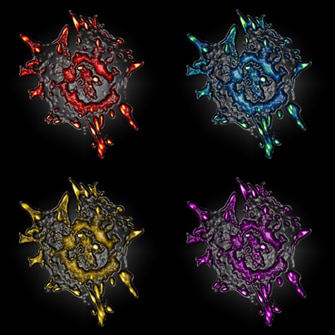Building research careers in a post-COVID world
Creative strategies used by early-career researchers during the pandemic to establish themselves could launch careers after the pandemic fades.
Proteintech collaborated with Nature Custom Media who produced this article.

 |
After COVID brought his research to a halt, postdoc Tejeshwar Rao shared fluorescent images of cells in bio-art competitions and on social media to build career momentum. Credit: Proteintech |
|
Tejeshwar Rao. Credit: Proteintech |
When COVID-19 hit and his lab shut down, Tejeshwar Rao had no way to work from home. His research at the University of Alabama, Birmingham, where he’s a postdoctoral fellow, involves measuring how cells generate force by developing probes that light up when cells tug on them. That requires a fluorescent microscope. “I was staring down a void,” Rao says. “I don’t have a microscope at home. I couldn’t keep generating data. So I had to come up with alternative ways to stay relevant.” His solution? Post on social media — and find the right hashtag. “If it was #FluorescenceFriday, I would post a fluorescent image on Instagram,” he says. “If a picture speaks a thousand words, I can use a pretty image to say something about my science.” Rao’s pandemic efforts have since taken prizes in multiple bio-art competitions and made the cover of the Journal of Cell Science. Early-career researchers (ECRs) have always faced tremendous pressure to present, publish, secure funding and build their brand — all with little experience and relatively few professional contacts. And that was before the coronavirus shuttered labs and canceled conferences. To maintain momentum, young scientists have found creative ways to gain experience and attract attention to their work — with backup from senior faculty and key support from empathetic reagent suppliers. The new strategies they’re using are helping them carve out their scientific niche — and can continue to do so when the pandemic finally ebbs. |
Virtual conferences, real benefits
|
Maria Davern. Credit: Proteintech |
Academic conferences have always been a cornerstone of the scientific enterprise, and when the pandemic shut many conferences down, it led others toward a new online presence. Earlier this year, Maria Davern, a graduate student at Trinity College Dublin, presented her research at an online cancer immunotherapy meeting for ECRs organized by Proteintech, a manufacturer of antibodies, bioactive proteins and workflow solutions kits. “Virtual meetings are brilliant,” says Davern, who works on enhancing the ability of checkpoint inhibitors to boost the immune system and kill cancer cells. “For early career researchers who don’t have as much funding for travel, attending online events allows you to keep up to date with novel, cutting-edge research.” Virtual meetings also offer ECRs a new platform to present their work to a broad scientific audience. “At the really big conferences, it can be difficult to get an oral presentation as an early career researcher,” Davern says. For these reasons, industry has stepped up to help by creating programmes for ECRs. Proteintech, for example, has created multiple opportunities for ECRs, including travel grants, mentor and lab manager awards, and virtual conferences. “We’re here to enable and serve science, and support for graduate students and ECRs is central to our philosophy,” says Deepa Shankar, Proteintech’s chief scientific officer. “ECRs are the future.” |
Networking for success
|
Tara Spires-Jones. Credit: Proteintech |
Whether virtual or live, conferences offer ECRs opportunities to network, build relationships with senior scientists, and establish their reputation. Approaching senior scientists can be awkward for ECRs, but established researchers can help by taking the lead. For example, at a virtual meeting on neurodegeneration that Proteintech organized in 2020, Tara Spires-Jones, a professor of neuroscience at the University of Edinburgh, set up some small collaborations with ECRs who contacted her after her presentation. Conference organizers can make it easier, too — some conferences, such as the IACR, sponsor built-in networking opportunities. “You fill out a form and then get paired with a PI during one of the lunch breaks,” Davern says. At the 2019 IACR meeting, Davern’s lunch partner told her about Anthony Letai’s lab at the Dana Farber Cancer Institute in Boston, Massachusetts, where she’ll start her postdoctoral studies in November. “When sponsors and organizers are inclusive, everyone wins”, Spires-Jones says. At the virtual meeting on neurodegeneration, she says, “everyone I talked to said that early career researchers gave the best talks. They’re exciting, focused, polished — and they keep to time.” |
Paying it forward
“Mentoring can also lead to productive liaisons”, Rao says. “Students come to me because I’m well trained in using any and every microscope available,” he says. “If you ask me to teach you a technique, my answer will always be yes.” This good citizenship led to a collaboration where Rao studied how the modification of cell-surface proteins alters the cell’s ability to generate force. It also earned him a Best Postdoc Mentor award from Proteintech.
Early career researchers can also search out opportunities to be mentored. Davern makes it a habit to sit in on webinars and virtual workshops that offer tips and tricks for building a successful career in academia. “Science isn’t just about doing experiments,” Davern says. “You need to get out of the lab and take advantage of opportunities to get better at communicating your research.”
Volunteering as a peer reviewer is another way to get an early edge. “Volunteers learn what goes into a good paper and how to formulate ideas in a way that’s accessible, interpretable and convincing to your peers,” says Spires-Jones, who is editor-in-chief of Brain Communications, a journal that recently launched its own reviewer academy. Journal editors benefit, too. “It’s a win for us, because it’s hard to find qualified reviewers,” she says.
Social science
Perhaps the biggest challenge facing ECRs is building their reputation in a crowded scientific community. Speaking at conferences is critical, but it’s not the only way. “I think it’s important to be active on Twitter,” Davern says. In her department, people tweet when they publish a paper or present at a conference. Senior scientists are tuning in, too. “It’s an efficient way to hear about exciting new work,” Spires-Jones says.
Twitter is also a great way to network and learn about interesting opportunities, Davern says. “If there’s a PI you’re interested in working with, you can ‘like’ and ‘share’ their papers — and you know they’ll see that,” she says. She was following Letai’s lab when she saw a tweet advertising a postdoctoral position in her exact area of expertise. “I thought, ‘Oh my God, this is perfect!’ If it wasn’t for Twitter, I wouldn’t have seen this position. So I’m definitely a fan.”
Rao is, too, especially on #FluorescenceFridays. “Being a scientist involves communicating what you do,” he says. “You need to take advantage of every possible opportunity to start a conversation, especially when you’re new. You have to speak for your science.”
Explore more resources for early career researchers at this dedicated resource from Proteintech.
Related Content
Interview with an Early Career Researcher: Odetta Antico
Navigating a PhD in a pandemic
How to prepare for a PhD Viva - Ten tips for success
Support
Newsletter Signup
Stay up-to-date with our latest news and events. New to Proteintech? Get 10% off your first order when you sign up.


